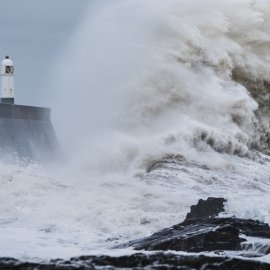Morality and the Ocean
-
English
-
ListenPause
[intro music] Welcome to World Ocean Radio… I’m Peter Neill, Director of the World Ocean Observatory. In my reading I came across this quotation from The Measure of Time by Gianrico Garofiglio: “Nature is morally neutral. It consists of wonderful things and horrible things. It makes no distinction between right and wrong. In nature there are no rewards or punishments, only consequences.” It was one of those statements made with such certainty, such finality, that it demanded consideration, then consternation over the realization that I had never thought of Nature this way before. Did I not think that Nature was inherently good, thus the embodiment of morality, a particular system of values to honor and conserve, and by which to live? Suddenly, that thought was contradicted by an undeniable alternative: that Nature has no inherent moral value, and that such consideration was a function of my persona, my attitude, and my actions. If we take the ocean as a paragon of Nature, with all its movement and change, all its many inhabitants, all its species, ugly and strange, we have a metaphoric place wherein to examine the truth of Garofiglo’s dictum. Yes, the ocean is at once wonderful and horrible. It has infinite moods and manifestations, revealed by its mechanics, four types of motion–rotary, oscillating, linear and reciprocating–in all directions at the same time, accentuated by a spectrum of light from dark absence to a fulsome, blinding purity into which we also cannot see. It is never static, and at each point in time is neither one thing completely or another as if it is suspended as a medium into which, valiantly, we attempt to swim. In my point of ocean view, there are a million moments of stasis in something so inherently dynamic, always in between one extreme or another, and that place is, where, indeed, there is no right or wrong. It is never fixed, ever changing, unless I impose upon it some rationale, some explanation, some system of data or process, some finality that, if a perfect, placid day, is wonderful, if a rampant, tumultuous storm of wind and wave is horrible, a wild, terrifying dichotomy and contradiction. The extremes are easy; it is the nuanced in-between that is confusion. A peaceful ocean is good; and angry ocean is bad, conclusion made through observation and experience. Our range of these events is, in effect, a diagram of moral judgements, black or white, no or yes, tranquility or fear, and then, all the emotional spaces in between where things get more complicated, less exact, more confusing, less certain. As written on sailors’ charts of unknown waters, “there be monsters in the margins.” Could the same be asserted for human nature? There is a comparable extent to our intellectual and emotional spectrum–happiness vs misery, optimism vs despair, pessimism vs hope for the future. Are we all now aswim in an ocean of feelings and fears which seem irrational and irreconcilable? And so, to explain, to defend, we make judgements, assert prejudices, reject alternatives, and use morality as justification for our action, acceptance, and rejection in a sea of separation, in a confusing gyre of impersonal circumstance and interpersonal relation? The consequences are evident, and yet we still attempt to mete out rewards and punishments using the harsh intractability of moral absolutes. This condition seems to me desperate, destructive and amoral. If we are attempting to make way forward in such a sea state, we are losing ground. In this oceanic world, maybe it’s time for a little moral neutrality, a return to an accommodating natural state. Maybe we should focus on how to change the consequences of our actions, take responsibility for what we have done to create this disconcerting world we live in, and affirm our moral conviction through humanity, community, creativity, and courage as tools for change. By such action we will outline the true measure of our time. We will discuss these issues, and more, in future editions of World Ocean Radio. [outro music]
This week on World Ocean Radio: reflections on the morality of nature and the ocean. How do we change the consequences of our actions, and take responsibility for what we have done to create the world we find ourselves in? Is it time for a bit of moral neutrality to return to a more accommodating, natural state?
About World Ocean Radio
Peter Neill, Director of the World Ocean Observatory and host of World Ocean Radio, provides coverage of a broad spectrum of ocean issues from science and education to advocacy and exemplary projects. World Ocean Radio, a project of the World Ocean Observatory, is a weekly series of five-minute audio essays available for syndicated use at no cost by college and community radio stations worldwide.
World Ocean Radio is produced in association with WERU-FM in Blue Hill, Maine and is distributed by the Public Radio Exchange and the Pacifica Network.
Available for podcast download wherever you listen to your favorites.
Image
Marcus Woodbridge via Unsplash
Porthcawl, UK
Reference
The Measure of Time by Gianrico Garofiglio
publishersweekly.com/978-1-913394-48-6
- Login to post comments



